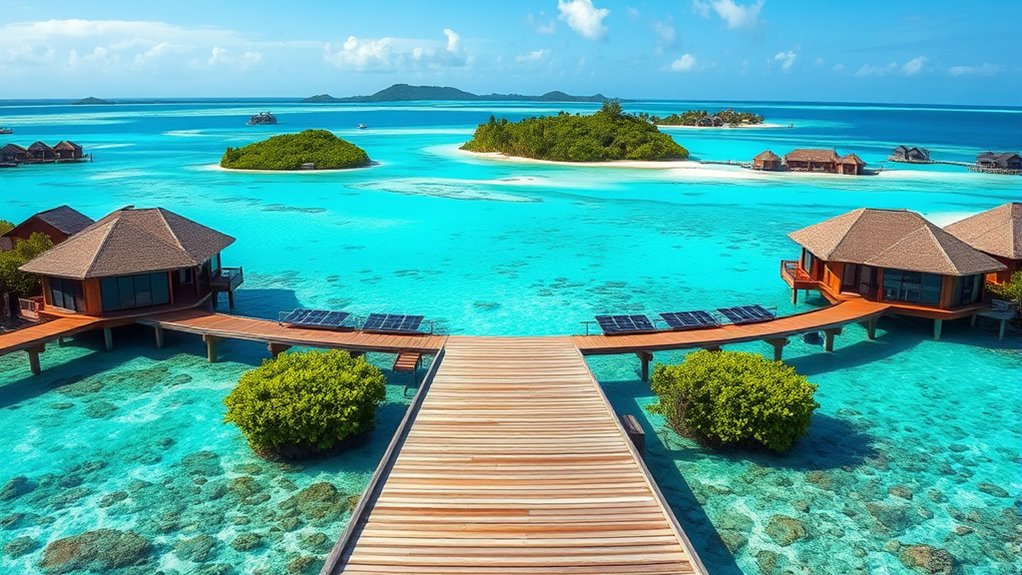Sustainable luxury travel offers eco-friendly destinations where you can indulge responsibly. Places like Indonesia’s Bawah Reserve operate on renewable energy, while Rwanda’s safaris support biodiversity and local communities. Costa Rica and Norway use clean tech like solar, wind, and seawater cooling. From the Maldives to Chile and Bhutan, these destinations combine high-end comfort with environmental preservation, supporting local cultures. Explore further to discover how these eco-conscious choices create truly responsible escapes.
Key Takeaways
- Many eco-luxury resorts utilize renewable energy sources like solar, wind, and biofuel to minimize environmental impact.
- Certified destinations, such as those with Green Globe or Swisstainable certification, ensure responsible tourism practices.
- Conservation efforts in destinations like Rwanda and Tetiaroa support biodiversity, marine life, and habitat preservation.
- Local community engagement and employment at eco-resorts promote sustainable livelihoods and cultural preservation.
- Innovative cooling and energy technologies, such as seawater air conditioning and floating solar, enhance eco-friendly luxury experiences.
Bawah Reserve, Indonesia
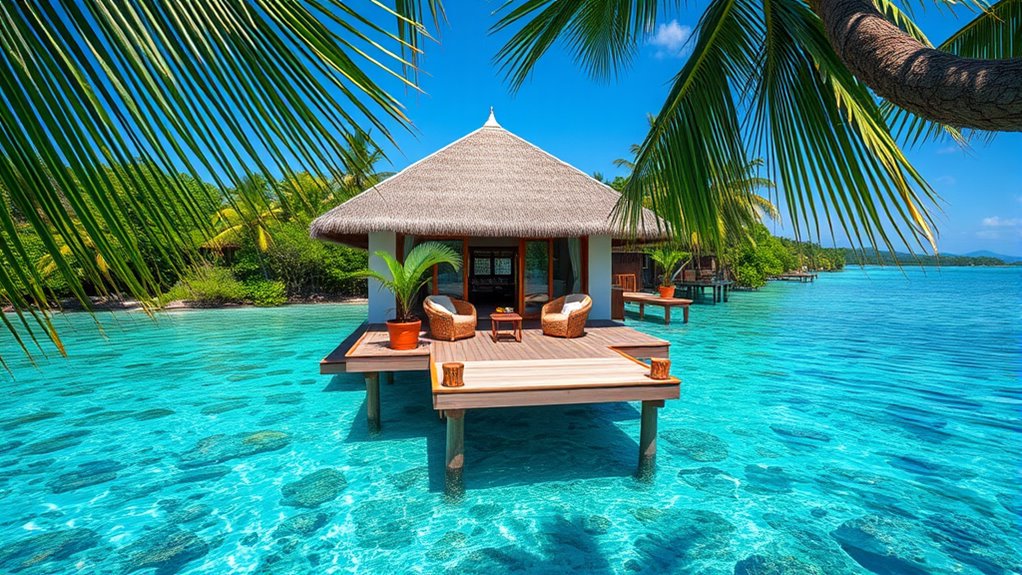
Have you ever wondered where luxury meets sustainability? Bawah Reserve in Indonesia exemplifies eco-friendly luxury travel. Situated on six islands, it champions sustainability by running entirely on renewable energy from 18 floating solar platforms, making it a pioneer in eco-conscious resorts. The resort emphasizes conservation through initiatives like turtle protection and beach clean-ups, actively involving local communities. With 98% of staff being local, it supports regional employment and cultural preservation. Dining is farm-to-table, sourced from permaculture gardens to minimize environmental impact. Bawah Reserve’s commitment to eco-friendly practices and renewable energy underlines that luxury doesn’t have to compromise environmental stewardship. It’s a perfect destination for travelers seeking sustainable experiences that prioritize conservation and uplift local communities.
Rwanda, Africa
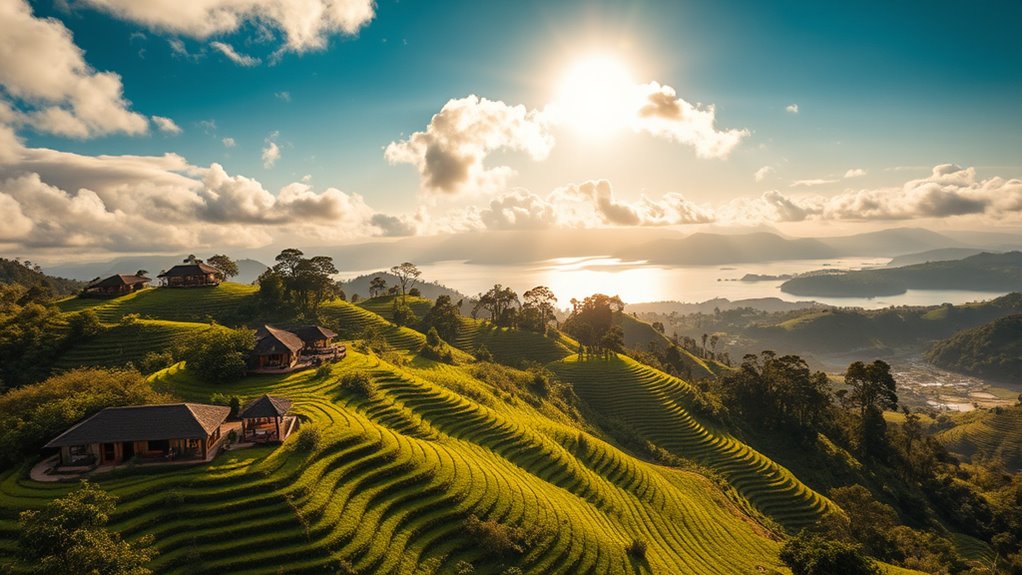
In Rwanda, you can experience wildlife conservation firsthand through mountain gorilla safaris that support safeguarding these majestic creatures. The country also empowers local communities by involving guides and artisans in sustainable tourism efforts. These initiatives ensure your visit benefits both the environment and the people, making your travel truly responsible. Cultural activities play a vital role in preserving the nation’s heritage while promoting eco-friendly practices. Additionally, the preservation of classic arcade games reflects a commitment to cultural heritage and sustainable entertainment options. Incorporating environmental preservation efforts into tourism initiatives helps ensure long-term sustainability and community benefits.
Wildlife Conservation Initiatives
Did you know that Rwanda’s wildlife conservation efforts are deeply integrated into sustainable tourism experiences? The country’s protected areas, like Volcanoes National Park and Nyungwe Forest, focus on wildlife conservation through eco-friendly tourism practices. These initiatives include:
- Supporting anti-poaching efforts with specialized units and trained dogs to patrol protected areas.
- Rehabilitating poachers into conservation guides, creating sustainable livelihoods.
- Promoting community-based projects that benefit local economies while preserving biodiversity.
- Funding gorilla trekking tourism that directly supports habitat protection and anti-poaching initiatives.
- Incorporating textile art techniques into community crafts to raise awareness and generate additional income for conservation efforts.
- Utilizing AI security technologies to monitor and prevent illegal activities such as poaching, ensuring continuous protection of wildlife.
- Implementing sustainable tourism practices that minimize environmental impact and promote conservation awareness among visitors.
- Enhancing eco-tourism infrastructure to ensure minimal disturbance to natural habitats and improve visitor experiences.
Community Empowerment Programs
Rwanda’s community empowerment programs play a vital role in sustaining its wildlife conservation efforts by actively involving local residents in protection and tourism activities. Through community empowerment, locals are trained as conservation guides, turning former threats like poaching into opportunities for sustainable tourism. Rural women take on guiding and porter roles, fostering gender equality and boosting local livelihoods. Initiatives like the Mara Conservancy Canine Anti-Poaching Unit involve community members directly in wildlife protection, strengthening eco-tourism. Tourism revenue is reinvested into local development projects, improving healthcare, education, and infrastructure. Over 98% of staff in Rwanda’s eco-tourism lodges come from local communities, ensuring that benefits of sustainable tourism reach residents. These programs create a positive cycle of wildlife protection and economic empowerment. Additionally, safety features in eco-friendly accommodations help ensure visitor security, encouraging responsible tourism practices. Incorporating community participation enhances the sustainability of conservation efforts by fostering a sense of ownership among locals. Furthermore, engaging local communities in conservation fosters a sense of stewardship that is crucial for long-term success.
Peninsula Papagayo, Costa Rica
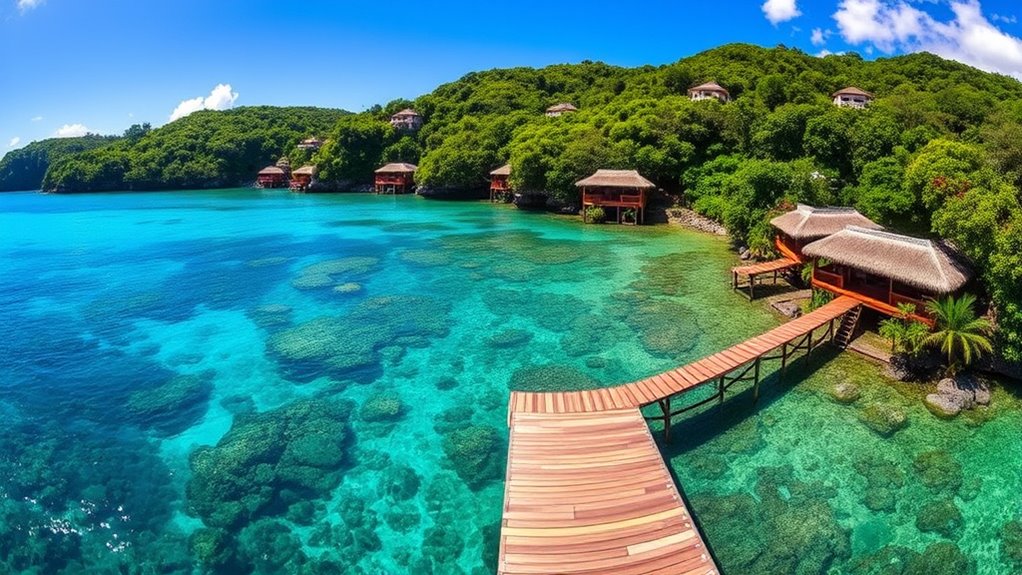
Ever wondered how luxury travel can harmonize with environmental responsibility? Peninsula Papagayo in Costa Rica exemplifies sustainable luxury travel, blending eco-friendly resorts with conservation efforts. This region is part of Costa Rica’s goal to become the first carbon-neutral nation, with 93% of energy from renewable sources. You’ll find initiatives like promoting local agriculture through ‘home gardens,’ empowering the community. The resort supports environmentally conscious practices such as drip irrigation, helping local families grow vegetables. Its conservation programs protect the region’s dry tropical forests and pristine coastline. Here are four key features:
- Commitment to renewable energy
- Support for local communities
- Conservation of natural habitats
- Implementation of eco-friendly initiatives
By integrating renewable energy sources, Peninsula Papagayo demonstrates a deep commitment to reducing its carbon footprint. Additionally, fostering community engagement is essential for the success of sustainable tourism initiatives. Embracing environmental responsibility ensures that luxury travel remains compatible with ecological preservation and community well-being.
Lyngen Alps, Norway
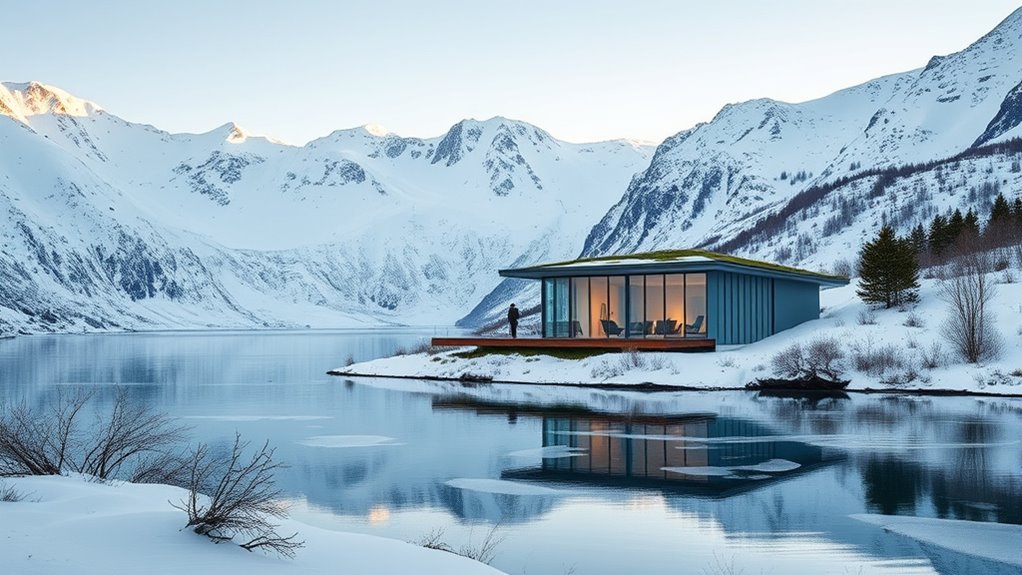
Building on Costa Rica’s commitment to sustainability, the Lyngen Alps in Norway showcase how pristine wilderness can be preserved while offering luxury experiences. This region exemplifies sustainable travel through eco-friendly accommodations like Aurora Lodge, which prioritize natural preservation and environmentally sustainable practices. You can enjoy spectacular views of rugged peaks and the Northern Lights with minimal ecological impact, thanks to wildlife conservation efforts that support local habitats. The area encourages responsible tourism, allowing you to immerse yourself in authentic local experiences while respecting the environment. By supporting local employment rooted in environmental stewardship, you help maintain the area’s natural ecosystems. Additionally, the use of renewable energy sources in the region’s accommodations exemplifies eco-friendly practices, further reducing the environmental footprint. The Lyngen Alps demonstrate that luxury and sustainability can go hand in hand, ensuring these breathtaking landscapes remain pristine for generations to come. Incorporating low-impact tourism initiatives helps sustain the delicate balance between visitor enjoyment and ecological preservation. Emphasizing conservation efforts, the region actively participates in protecting its unique flora and fauna to promote long-term ecological health. Moreover, promoting aesthetic wall organization systems in local lodges can enhance guest experience while supporting sustainable interior design.
Lake Lucerne, Switzerland

At Lake Lucerne, you’ll find the Bürgenstock Hotels & Resort, certified by Green Globe and Swisstainable Level 3 for its eco-friendly practices. The resort uses cold lake water for heating and cooling, cutting energy use markedly. You can also enjoy activities like regenerative dining and honey harvesting that highlight the region’s commitment to sustainability. Emphasizing natural materials in design and operations further enhances its eco-conscious approach. Incorporating sustainable building practices contributes to its environmentally friendly reputation and reduces its ecological footprint. Additionally, the resort’s approach to emotional manipulation awareness ensures guests are informed about sustainable and ethical tourism. Paying attention to recognizing and interpreting signs can deepen your connection with the environment and promote mindful tourism choices.
Green Globe Certification
Green Globe Certification signifies Lake Lucerne‘s commitment to sustainable luxury, with Bürgenstock Hotels & Resort leading the way. As a Green Globe member, the resort demonstrates its dedication to sustainable practices, environmental management, and responsible tourism. This certification highlights several key initiatives:
- Utilizes deep lake water for heating and cooling, reducing energy use and emissions
- Upholds strict standards for conservation and social responsibility
- Offers immersive eco-friendly experiences like regenerative dining and honey harvesting
- Balances luxury hospitality with environmentally responsible operations
- Recognizing the importance of regional legal resources, the resort ensures compliance with environmental regulations and promotes local community engagement.
Sustainable Hotel Initiatives
Sustainable hotel initiatives at Bürgenstock Hotels & Resort in Lake Lucerne showcase how luxury can coexist with environmental responsibility. The resort’s green practices include using cold, deep lake water for heating and cooling, drastically reducing energy use. They also promote eco-friendly products and support environmental protection through regenerative dining programs and honey harvesting, which bolster local biodiversity. The resort’s commitment to preserving natural resources and historic sites reflects its dedication to social responsibility. These initiatives demonstrate that sustainable luxury is achievable without sacrificing comfort. To emphasize this, consider the following:
| Initiative | Focus Area | Impact |
|---|---|---|
| Cold water systems | Energy efficiency | Reduces energy consumption |
| Regenerative dining | Biodiversity & ecology | Supports local ecosystems |
| Honey harvesting | Ecological restoration | Promotes habitat health |
| Eco-conscious materials | Sustainable sourcing | Minimizes waste |
| Carbon offset programs | Climate impact reduction | Lowers carbon footprint |
Additionally, implementing electric bikes as a sustainable transportation option can further reduce the resort’s carbon footprint and promote eco-friendly travel. Integrating renewable energy sources can enhance these efforts by further decreasing reliance on non-renewable power and lowering overall emissions.
Immersive Eco Experiences
Experiencing eco-friendly luxury at Lake Lucerne’s Bürgenstock Hotels & Resort means immersing yourself in a setting that seamlessly blends natural beauty with responsible practices. You’ll enjoy immersive eco experiences that highlight sustainable travel options, enriching your connection to the environment and local culture. The resort’s Green Globe and Swisstainable certifications ensure minimal environmental impact, with initiatives like using lake water for heating and cooling. Engage in community-based experiences such as regenerative dining and honey harvesting, promoting local biodiversity. These activities foster nature conservation while supporting local farmers. To maximize your eco-journey, consider:
- Participating in honey harvesting activities
- Enjoying regenerative dining experiences
- Exploring local cultural traditions
- Supporting sustainable agriculture initiatives
This blend of luxury and sustainability creates truly meaningful eco adventures.
Tierra Atacama, Chile
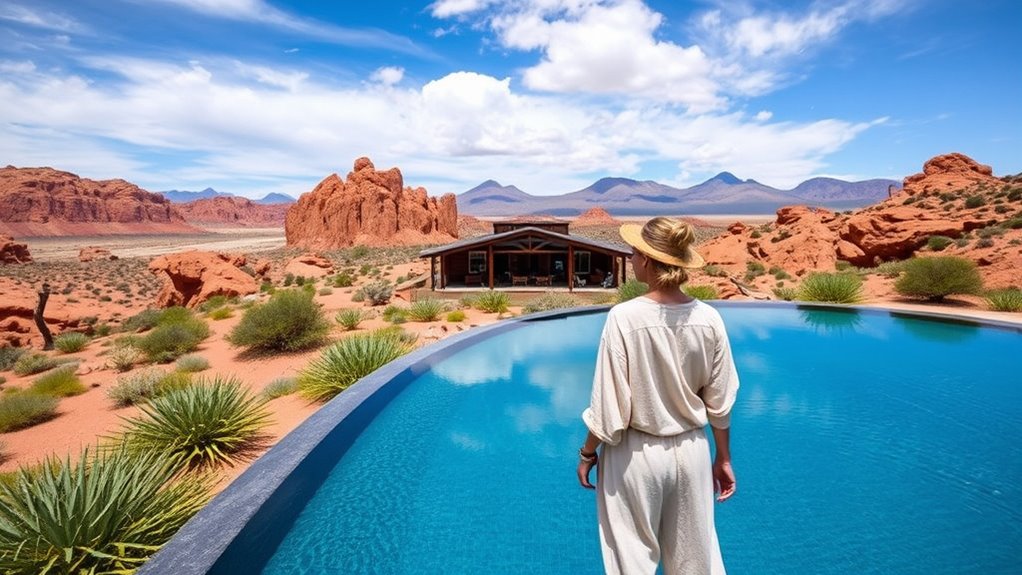
Nestled in the high northern deserts of Chile’s Atacama, Tierra Atacama offers a luxurious escape that prioritizes environmental responsibility. As a leader in sustainable travel, it features eco-friendly initiatives like solar-powered electricity and sourcing 100% of its water sustainably. You’ll enjoy eco-conscious luxury amid stunning landscapes such as sand dunes, geysers, and hot springs. The hotel’s pioneering use of renewable energy underscores its commitment to reducing its carbon footprint, while water conservation efforts help protect this fragile environment. Community engagement programs support local development, allowing you to experience authentic cultural exchanges. Tierra Atacama exemplifies how luxury travel can harmonize with eco-friendly practices, making it an ideal destination for travelers seeking sustainable experiences without compromising comfort or style.
Bhutan
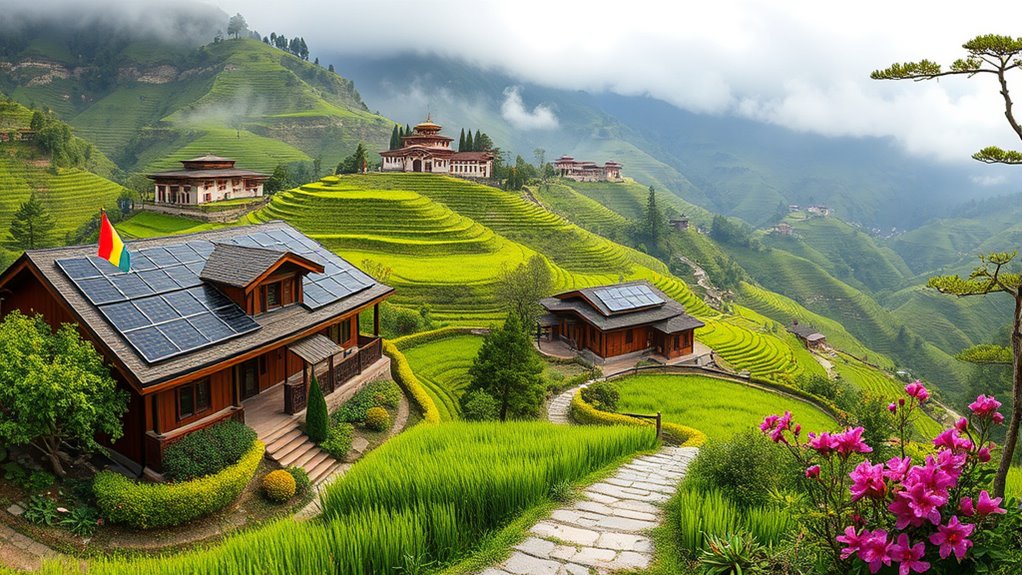
Bhutan stands out as a global leader in balancing tradition and environmental stewardship. Its approach to sustainable travel emphasizes environmental conservation and cultural preservation. With over 60% of its land protected as national parks and biological corridors, Bhutan guarantees native species thrive. The country’s eco-friendly initiatives include eco-lodges built with traditional materials and community-based conservation programs. You’ll notice Bhutan’s commitment to renewable energy, with nearly 100% of electricity generated from hydropower. To experience its sustainable luxury, keep in mind:
Bhutan leads in sustainable travel through conservation, cultural preservation, and renewable energy initiatives.
- Strict visitor limits through a high-value, low-impact tourism policy
- A daily sustainable development fee supporting local communities
- Preservation of cultural heritage and natural landscapes
- Active participation in community-based conservation efforts
This combination makes Bhutan a pioneer in eco-conscious, culturally rich travel.
Tetiaroa, French Polynesia
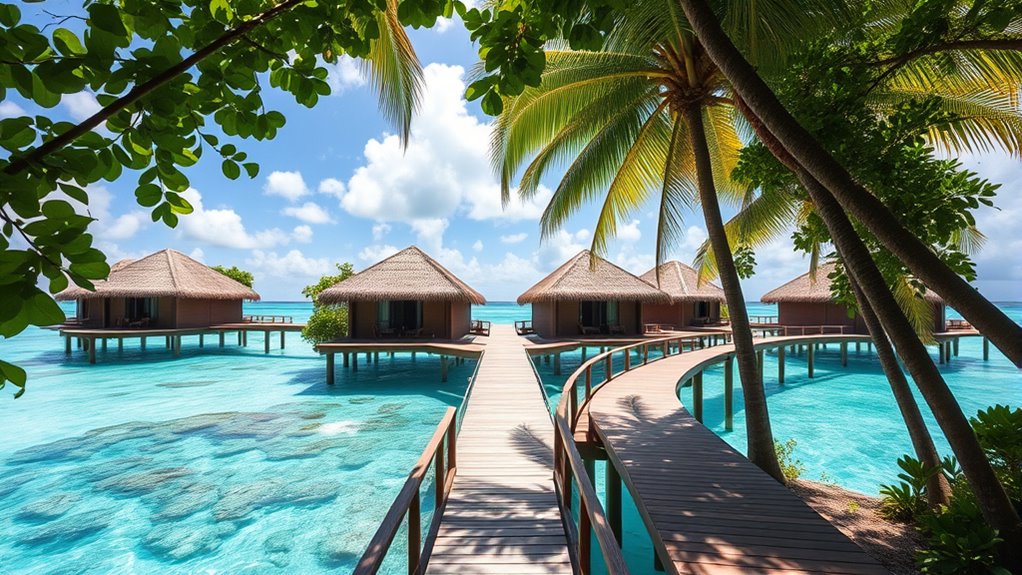
Tetiaroa, a pristine atoll in French Polynesia, exemplifies how luxury travel can prioritize environmental sustainability. The Brando, a luxury resort on the island, operates entirely on renewable energy sources like solar, wind, and biofuel, showcasing eco-friendly destinations at their best. Its seawater air conditioning system reduces energy use while supporting marine life, and organic farming minimizes environmental impact. Conservation efforts focus on protecting coral reefs, restoring native vegetation, and empowering local communities through sustainable practices. This approach demonstrates that sustainable travel can blend luxury with ecological responsibility. Here’s a snapshot of Tetiaroa’s eco-initiatives:
| Initiative | Focus Area | Impact |
|---|---|---|
| Renewable energy | Solar, wind, biofuel | Carbon-neutral luxury experience |
| Seawater air conditioning | Energy reduction | Supports marine ecosystems |
| Conservation programs | Reefs, vegetation | Preserves biodiversity |
| Local community support | Sustainable practices | Enhances local livelihoods |
Sustainable Practices and Eco-Conscious Activities
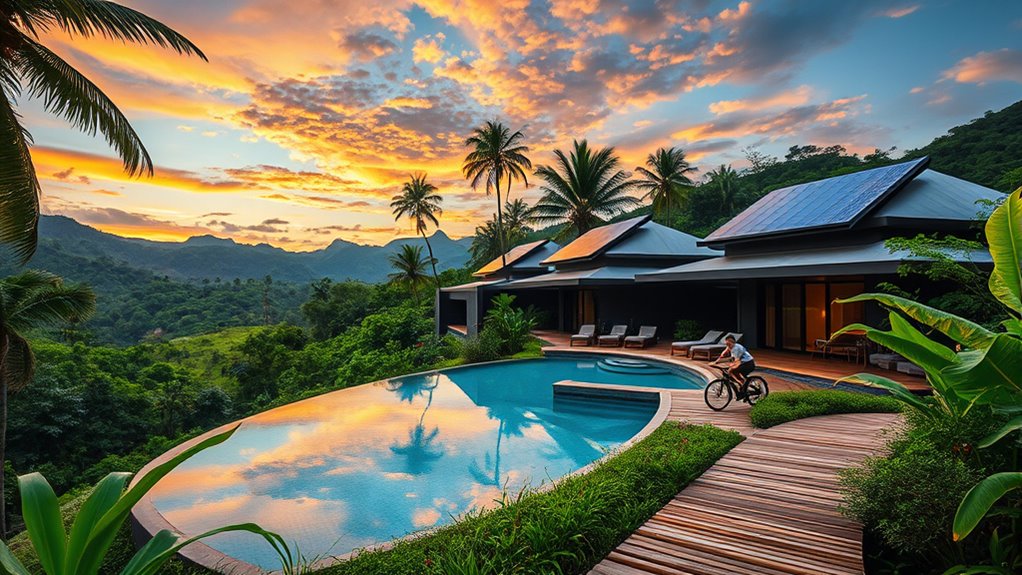
Implementing sustainable practices and engaging in eco-conscious activities allow luxury travelers to minimize their environmental impact while enriching their experience. By choosing destinations that prioritize sustainability, you support conservation and local communities. Consider these key actions:
- Opt for resorts using renewable energy, like floating solar platforms, to reduce your carbon footprint.
- Participate in eco-conscious activities such as wildlife conservation safaris or geothermal hiking, promoting environmental awareness.
- Support sustainable practices like organic farming, water sourcing from local springs, and waste reduction initiatives.
- Choose destinations with certifications, like Green Globe or Swisstainable, ensuring rigorous standards for energy, water, and community engagement.
These practices help preserve wildlife, promote conservation efforts, and benefit local populations, making your luxury travel both meaningful and environmentally responsible.
Frequently Asked Questions
What Is the Most Sustainable Tourism Destination?
You wonder which destination is the most sustainable for tourism. While many places excel in eco-friendly practices, Costa Rica often stands out. It leads in biodiversity conservation, renewable energy, and sustainable accommodations. You can enjoy eco-tours, wildlife watching, and responsible lodging that support local communities. By choosing Costa Rica, you actively contribute to environmental preservation while experiencing rich natural beauty, making it an excellent choice for sustainable travel.
What Is the Most Eco-Friendly Travel?
You’re probably wondering what counts as the most eco-friendly travel, right? Well, it’s not about jetting off to the most exotic spots and ignoring your carbon footprint. Instead, you can choose destinations that run on renewable energy, like solar-powered resorts, or travel by train in eco-conscious cities. Supporting places with green certifications and engaging in low-impact activities makes your journey truly sustainable—and surprisingly, more rewarding.
Can Luxury Travel Be Sustainable?
You might wonder if luxury travel can be sustainable. The answer is yes — it’s increasingly possible to enjoy high-end experiences while caring for the environment. You can choose eco-certified accommodations, support conservation projects, and opt for innovative transportation like electric flights or hybrid vehicles. By making mindful choices, you get the benefits of luxury while minimizing your environmental impact, proving that sustainability and indulgence can go hand in hand.
Which Country Is the Best for Sustainable Tourism?
When choosing the best country for sustainable tourism, consider Costa Rica. You’ll find it leads in eco-friendly initiatives, with over 99% renewable energy and numerous conservation programs. You can enjoy eco-lodges, wildlife experiences, and pristine rainforests while supporting local communities. Costa Rica’s commitment to environmental preservation makes it an ideal destination for travelers like you who want luxury and sustainability to go hand in hand.
Conclusion
As you explore these eco-friendly destinations, you’re like a gentle breeze stirring change in the travel world. By choosing sustainable luxury, you not only indulge in breathtaking beauty but also nurture the planet like a caring gardener tending to delicate blooms. Every mindful step you take helps preserve these pristine places for future adventurers. So, let your journey be a ripple of positive impact, turning your luxury escape into a beautiful act of conservation that echoes far beyond your stay.
